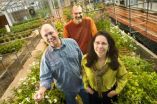(Press-News.org) People who have a long term debilitating physical illness demonstrate mental resilience according to Understanding Society, the world's largest longitudinal household study. The first findings reveal that people diagnosed with cancer, diabetes, respiratory or cardiovascular disease report similar mental health scores to those without physical illness. The survey's findings suggest that those people who may not be able to function well physically because of an illness do not necessarily suffer problems with their mental health - for example with their concentration, confidence and feelings of strain.
Another surprise finding from the study is that over half (52 per cent) of those indicating high levels of distress and anxiety, and therefore identified as at risk of suffering minor mental illness, still report fairly positive overall mental well-being.
Professor Amanda Sacker, Institute for Social and Economic Research, who analysed the findings, commented: "Initial findings regarding mental health may appear counter-intuitive but it is good to see such resilience amongst those with long term physical illnesses. Understanding Society will continue to follow the same people in years to come as they get older. As they change their health-related behaviours and experience different health, work and family challenges this will give us a good insight into the factors that cause mental health problems and how to provide the best support."
Initial analysis of the data collected in the first survey also found that:
self rated mental health did not differ between England, Scotland, Wales and Northern Ireland
there are no differences between males and females, with 50 per cent rating their overall health as either 'excellent' or 'very good'
thirty-seven per cent of males and 38 per cent of females have a long term illness; of these 68 per cent of males and 71 per cent of females reported limitations in the last month. Climbing stairs as well as the amount and kinds of work that can be done were the most common stated, with women tending to report recent limitations more than men
asthma, arthritis and high blood pressure are the three most prevalent conditions, each affecting over 10 per cent of the sample
overall figures indicate that seven per cent of the total population (approximately 25,000 respondents) have at some point in their lives been diagnosed with clinical depression and that of those people the majority (69 per cent), currently suffer from depression.
Understanding Society is following 40,000 UK households over many years and will revisit health, family life, employment and a range of other aspects of people's lives. The survey is funded by the Economic and Social Research Council (ESRC) and managed by the Institute of Social and Economic Research (ISER) at the University of Essex. The first findings book is published online at http://research.understandingsociety.org.uk/findings/early-findings. Individual chapters are also available to download.
The first set of data from Understanding Society is now available for researchers to use in their analysis. It can be accessed via the Economic and Social Data Service.
INFORMATION:
ESRC Press Office:
Victoria Morrisroe (Tel: 01793 413163, email: victoria.morrisroe@esrc.ac.uk )
Jeanine Woolley (Tel: 01793 413119, email: jeanine.woolley@esrc.ac.uk )
Danielle Moore (Tel: 01793 413122, email: danielle.moore@esrc.ac.uk)
NOTES FOR EDITORS:
1. The findings above are taken from the chapter 'Health over the life course: associations between age, employment status and well-being' in the Understanding Society 'First Findings' publication. The full chapter can be found at http://research.understandingsociety.org.uk/findings/early-findings
2. Amanda Sacker is Professor of Quantitative Social Science. Her research takes a life course perspective to examining the social epidemiology or the social determinants of health, including differences in health (both physical and mental) by social class, gender and ethnicity.
3. Cara Booker is a researcher. Her research interests range from exploring the psychosocial and physiological determinants of health over a lifetime to psychological well-being and resilience among the unemployed. Amanda and Cara are both based at ISER.
4. Understanding Society is a world leading study of the socio-economic circumstances in 40,000 British households. The study allows for deeper analysis of a wide range of sections of the population as they respond to regional, national and international change. Understanding Society will greatly enhance our insight into the pathways that influence peoples longer term occupational trajectories; their health and well-being, their financial circumstances and personal relationships. Understanding Society also breaks new ground with its interdisciplinary focus. The study will capture biomedical data on 20,000 participants and place this alongside rich social histories, helping us weigh the extent to which people's environment influences their health.
5. Understanding Society has been commissioned by the Economic and Social Research Council (ESRC). The Research Team is led by the Institute for Social and Economic Research (ISER) at the University of Essex. The National Centre for Social Research (NatCen) delivers the Study.
6. The ESRC has contributed £27 million towards the funding of Understanding Society, and have successfully secured a total of £19.4 million from the Department for Business, Innovation and Skills Large Facilities Capital Fund. A further £2.61 million has been secured from a consortium of Government Departments. This funding will support the first five waves of the study until 2015. It is envisaged that the study will continue for up to 20 years.
7. The Economic and Social Research Council (ESRC) is the UK's largest organisation for funding research on economic and social issues. It supports independent, high quality research which has an impact on business, the public sector and the third sector. The ESRC's total budget for 2011/12 is £203 million. At any one time the ESRC supports over 4,000 researchers and postgraduate students in academic institutions and independent research institutes. More at www.esrc.ac.uk
END
The Ohio residential correctional programs – halfway houses and community-based correctional facilities – that are most successful at reducing recidivism among offenders enjoy an impressive track record.
An offender participating in the state's most successful programs is 50 percent less likely to engage in criminal activity in the two-year period following release vs. offenders who receive no guidance or services. In contrast, the least successful of these programs actually increased the chances of criminal recidivism. The least successful programs increased recidivism ...
DURHAM, N.H. – Rural workers have less access to sick leave, forcing them to choose between caring for themselves or family members, and losing pay or perhaps even their jobs when faced with an illness, according to new research from the Carsey Institute at the University of New Hampshire.
"Paid sick days are a central component of job flexibility for rural and urban workers alike. Everyone gets sick, and the lack of paid sick days can place workers in a bind, especially given that workers who lack paid sick days are also more likely to lack other paid leave options, ...
EAST LANSING, Mich. — By honing in on the mysterious potato genome and its tuber – its edible portion – researchers are unveiling the secrets of the world's most-important nongrain food crop.
Robin Buell, Michigan State University plant biologist, is part of an international research team that is mapping the genome of the potato. In the current issue of Nature, the team revealed that it accomplished its goal, thus quickly closing the gap on improving the food source's elusive genome.
The potato is a member of the Solanaceae, an economically important family that includes ...
The Potato Genome Sequencing Consortium (PGSC), a team of scientists from institutions worldwide, including Virginia Tech, has published its findings in the Sunday July 10 online issue of the journal Nature.
The successful sequencing of the genome of the world's third most important crop began when Richard Veilleux, who is the Julian and Margaret Gary Professor of Horticulture in the College of Agriculture and Life Sciences at Virginia Tech, wondered if the then new applications of plant tissue culture could be used to develop parent lines for hybrid potatoes. The concept ...
Becoming a Workamajig expert requires a replete understanding of the platform (Client Services, Project Management, Trafficking, CRM and Finance modules) and the rollout of the solution for a minimum of three agency clientele. We are extremely pleased, states Vanessa Edwards, President and Founder of CPI. "My journey with Workamajig began nearly five years ago, when I was searching for a solution to help improve my own agency's realization rates, drive efficiency and improve profitability. Post-adoption, our AGI went from 75% to 200% of the national average... providing ...
BURGESS, the superyacht leader, joins OCEANA's prestigious group of corporate donors and becomes active sponsors of the group's major events and activities. Partly founded by actor Ted Danson and recently named a 4-star charity for sound fiscal management, Oceana is the largest international advocacy group working solely to protect the world's oceans.
The initial collaboration of the two organizations resulted in this year's highly successful "Bid To Save The Earth" Green Auction when heated bidding on a four day/three night BURGESS luxury yacht charter courtesy ...
Saranac Lake, N.Y. – New research from the Trudeau Institute may help to explain why anticoagulant therapies have largely failed to extend the lives of patients with sepsis. The study was led by Deyan Luo, a postdoctoral fellow in Stephen Smiley's laboratory. It shows that fibrin, a key product of the blood clotting process, is critical for host defense against Yersinia enterocolitica, a gram-negative bacterium that causes sepsis in humans and experimental mice. The new data will be published in the August 15 issue of The Journal of Immunology and is available now online ...
Applying a vaccine patch to the skin with thousands of tiny micro-needles could help boost the body's immune response and prevent the spread of life-threatening infections like HIV and TB, a major Cardiff University study aims to uncover.
Professor Vincent Piguet from Cardiff University's School of Medicine, has been awarded almost a million dollars by the Bill & Melinda Gates Foundation to examine how key immune cells in the skin can be targeted to cause the immune system to produce antibodies against infection.
Recent advances in the prevention and treatment of ...
A new drug has recently been discovered in Russia, and is taking the country by storm. The drug is called krokodil or crocodile, named for the gruesome effects the drug has on the users' appearance. The skin of the user literally begins to rot. At the injection site, which can be anywhere where there is a suitable vein, the users complexion becomes greenish and scaly, like a crocodile's, blood vessels rupture and the skin tissue dies. Gangrene and amputations are a common result, bone tissue, especially in the lower jaw begins to deteriorate, slowly being disintegrated ...
College athletes tend to be less likely than their non-athlete peers to smoke marijuana. But when they do, they may have some different reasons for it, according to a study in the July issue of the Journal of Studies on Alcohol and Drugs.
Past studies have shown that athletes generally smoke marijuana less often than other college students do.
"But there is still a pretty large number who choose to use it," said Jennifer F. Buckman, Ph.D., of the Center of Alcohol Studies at Rutgers University in Piscataway, New Jersey.
Because marijuana could have ill health effects—and ...


